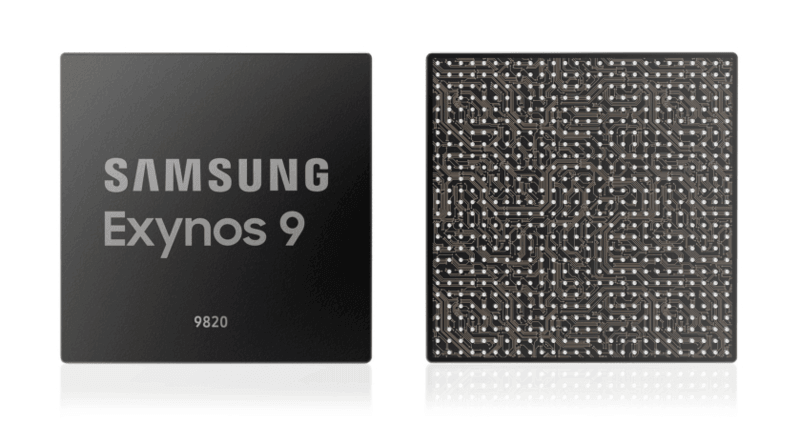With the news of the upcoming Samsung Galaxy S10 spreading like wildfire on the internet, Samsung is already hyping up its operations. In a related development, the Korean giant has unveiled its new chipset which will be used in the upcoming Samsung flagships including the Samsung Galaxy S10. This new processor is expected to compete with the Huawei’s in-house manufactured Kirin 980 and Qualcomm’s Snapdragon 855. This is also Samsung’s first CPU to debut with the 8nm process, tri-cluster CPU and a dedicated Neural Processing Unit (NPU) to power the AI operations on the phone. Read ahead to know more about what the latest CPU by Samsung has in store to offer.

Two Custom CPU Cores Combined With NPU and Cortex
The Exynos 9820 boasts of having tri-cluster CPUs meaning that the chipset comes with three types of cores including two custom CPU cores which are possibly being codenamed Mongoose M4. The other two clusters in the chipset include two cores of Cortex-A75 and four cores of Cortex-A55. As per Samsung’s claims, its new CPU can perform with 20% more efficiency in single core, 15% more efficiency in multi-core and it will also be able to achieve 40% power efficiency when necessary.
Despite the expectations of an in-house manufactured GPU with this chipset, we will get to notice that the Exynos 9820 will work with the ARM Mali-G76MP12 GPU for delivering top-notch graphics quality. Samsung has also claimed that this new GPU along with the CPU’s high performance will be able to promise 40% better performance when compared to the previous GPU used with the Exynos 9810. In terms of power, the GPU will be able to perform with 35% more efficiency. This performance won’t only extend the battery life, but will also help AR and VR applications run on Samsung devices without putting a lot of strain on the battery. The SoC will pair up with LPDDR4X RAM and UFS 3.0 and UFS 2.1 storage chips.
The highlight of this new CPU is also the dedicated Neural Processing Unit (NPU) which will assist the device in carrying out AI(Artificial Intelligence) and ML(Machine Learning) applications without needing it to connect to a server online. This will also keep the user’s data secure. Some of the uses of the dedicated NPU will include faster scene detection via AI-assisted features and many more AI based camera functions. The Korean giant has also asserted claims saying that Exynos 9820 will be 700% faster when compared to the Exynos 9810 in AI-based capabilities.
Another thing to note is that the Exynos 9820 does not support 5G because of the absence of a 5G modem. Instead, there is an integrated 4G LTE Advanced Pro modem that offers the capability of Cat.20 8CA (8 Carrier Aggregation) 2Gbps download speeds and around Cat.20 3CA 316Mbps uploads speeds. There are also going to be network connectivity features like 4×4 MIMO (Multiple-Input, Multiple-Output), 256-QAM (Quadrature Amplitude Modulation) and eLAA (enhanced Licensed-Assisted Access). Overall, the Exynos 9820 will be able to offer better network connectivity and much more stable performance.
Support for 8K Video Capture and 5 Camera Sensors
The Exynos 9820 sports the latest ISP (Image Signal Processor) along with a new MFC (Multi-Function Codec) which renders the device with Exynos 9820 to sport five sensors which are most probably going to be 22MP Front and Rear or 16MP+16MP Dual-Camera besides an IR sensor. The highlight of the chipset is its capability to record 8K 10-bit HEVC videos at a frame rate of 30fps or up to 4K 10-bit HEVC videos at a very appreciable 150fps frame rate. However, this support does not necessarily mean that the upcoming Galaxy S10 will be able to carry these video recording modes since Samsung will have to equalise the performance of its current processor to that of the latest Snapdragon processor, which might not match Samsung’s performance.
First Samsung Device with Exynos 9820
Like a lot of you would expect, the Exynos 9820 will most likely make its first debut in the upcoming Samsung Galaxy S10. According to the speculations, Samsung will probably release the next flagship somewhere in the first quarter of 2019. Also, the company has announced that the mass production of this chipset will begin late in 2018, which means that there is a high probability of spotting the Exynos 9820 on the Samsung Galaxy S10 next year.
Vice President of System LSI’s Marketing at Samsung Electronics, Ben Hur also remarked, “As AI-related services expand and their utilisation diversifies in mobile devices, their processors require higher computational capabilities and efficiency. The AI capabilities in the Exynos 9 Series 9820 will provide a new dimension of performance in smart devices through an integrated NPU, high-performance fourth-generation custom CPU core, 2.0Gbps LTE modem and improved multimedia performance.”















